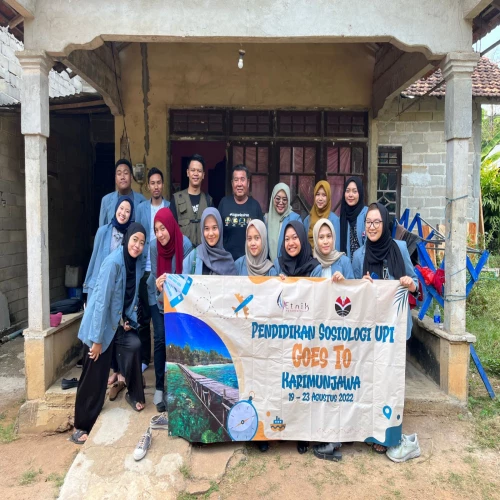Sociology Education FPIPS UPI Students Investigate Bugis Society Acculturation in Karimunjawa

Students of the Sociology Education Study Program, FPIPS UPI, have implemented Field Work Lecture (KKL) in the Karimunjawa area, Kab. Jepara, Central Java from August 19 – August 23, 2022. This activity was attended by 13 students from the class of 2019, accompanied by one field supervisor, namely Abdul Aziz, where one of the foci of the study was determined to be about the existence of the Bugis community in Karimunjawa.
Bugis Village is located in Telaga Village, Kemujan Island, Karimunjawa Archipelago, Regency. Jepara, Central Java. The Bugis village began with the Kahar Muzakkar incident, which caused many people to sail out of the Makassar area to avoid the conflict. One of the people who made the voyage is the father of Mr. Abdul Rozak, an elder in Bugis Village. He originally intended to reach Semarang, but was stranded in Karimunjawa and survived there.
So far, Bugis Village is known to the public in Makassar. However, there are also some in Karimunjawa. There are some interesting differences between the Bugis tribes in Makassar and the Bugis tribes in Karimunjawa, including social interactions that are more harmonious in the midst of a multicultural society. In addition, there is an acculturation that is easy to happen from inter-tribal marriages and communication between people following the opponent talk. On the other hand, Rozak said that the existence of Bugis Village itself is an effort to maintain the existence of the Bugis community in Karimunjawa. Of course, the existence of Bugis Village is not meant as an effort to match the customs that have grown before.
There are four hamlets in Bugis Village, namely Kemujan Hamlet, Telaga Hamlet, Hamlet Batuawang, and Dusun Merican. In this village there are several tribes, including Bugis, Javanese, and Madurese. Although in the village there are several tribes, they still maintain harmony by showing tolerance between tribes. First, mutual cooperation in various activities, for example, a routine celebration once a year in the month of May, which is called Alms of the Sea. The Celebration of the Sea Alms is carried out as a thanksgiving from fishermen to the Creator, to be grateful for life. Second, finish problems by way of kinship and deliberation. For example, when there is juvenile delinquency in the village, it is solved by presenting both the part of the elders of the community. This is to avoid the pathlaw by making notes containing a track record of problems and their efforts. Third, there is no prohibition against inter-tribal marriages. For example, the Bugis propose panai money for the terms of marriage but adjust to the financial capabilities of the bride and groom in question. In addition, they also do not forget to maintain the morale of the generation by providing education to foreign tourists who are considered inappropriate with applicable values and norms.
Meanwhile, Dilla Rifa Oktriani, as the head of the KKL student group, said that the acculturation process that occurred among the Bugis people in Bugis Village, Karimunjawa, can be adapted as a form of conflict resolution method. This method can be reflected in the life of the Bugis Village community, who always promote dialogue and deliberation with parties outside the Bugis community. For example, at the time of marriage involving the Bugis community with the Javanese, carried out on the basis of mutual agreement in terms of accommodating their respective customs. As a result, the marriage runs harmoniously without compromising the community group.
Then, Abdul Azis, as the Field Advisor Lecturer, saw that the existence of the Bugis community through the existence of Bugis Village in Karimunjawa can be used as an example of the embodiment of Bhinneka Tunggal Ika. He said this because the effort existence that occurs is not primordial but as a mutual effort to introduce and harmonize cultural differences so that they can coexist. Based on this research, the KKL student group can see that progress from various aspects that occurred in Karimunjawa can not be separated from the existence of togetherness that occurred in Karimunjawa. Because, if there is no togetherness in acculturating, of course, progress in various sectors will not run smoothly. The KKL student group hopes that acculturation that is running smoothly in Karimunjawa can continue to run well in the future and can provide an example to people outside Karimunjawa.